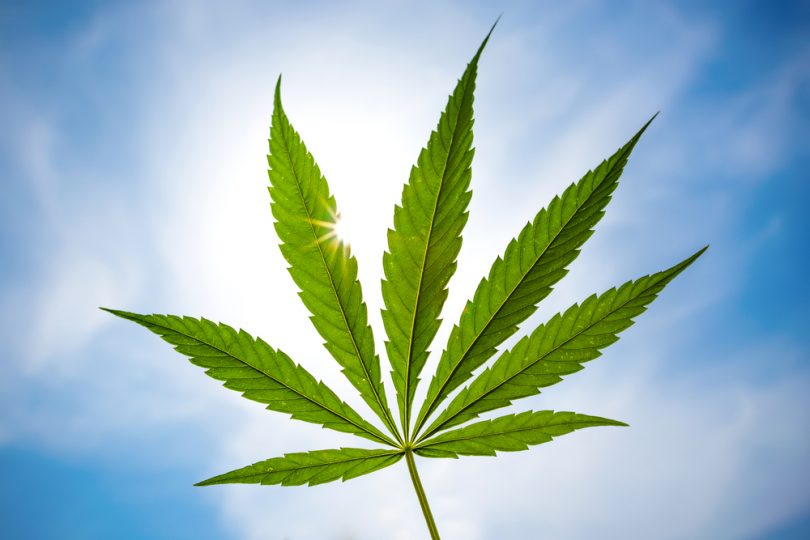Some stunts in life are dangerous, some are politically motivated, and some are just plain awesome! Bags of cannabis rained down on Israel yesterday, highlighting the contradiction of the country. As one of the most cannabis user-friendly and research-oriented countries, Israel has been dragging behind in terms of legalization.
Seriously, falling from the sky?
Yup, that’s exactly what happened. Yesterday, a drone flew over Rabin Square in Tel Aviv, a central meeting point, and the spot where many protests and festivities are held. Yesterday it was a protest of a different kind as a drone flying overhead dropped bags of what is believed to be cannabis, over the square, leaving eager passers-by to run after the free swag.
Two men have been arrested so far, and there’s a possible link to activist group Green Drone Group which has been pushing for legalization, and which made the statements on its Telegram account: ‘the time has come’, and ‘Is it a bird? Is it a plane? No, it’s the Green Drone sending you free cannabis from the skies’ which doesn’t claim responsibility per say, but does give credence to the belief they’re probably behind the incident.
To learn more about cannabis, subscribe to the Medical Cannabis Weekly Newsletter
Cannabis laws in Israel
In a minute we’ll get to just how much at the forefront of cannabis research and development Israel is, but that information can be misleading when looking at the actual laws that govern the country.
Basically, for as advanced and understanding as Israel is when it comes to cannabis, it’s illegal to possess or use it recreationally. Israel passed a rather pathetic version of decriminalization which looks to be way more about collecting fines than anything else, but which does allow for a small amount of personal use protection.
While all parts of the cannabis plant are prohibited by law (except for oil extracted from seeds), a decriminalization policy which went into effect in April 2019 allows for small amounts to be used in a home. No actual amount was specified to define this, but the expectation is that up to 15 grams is acceptable. Public possession still results in fines of approximately $275, but this is way down from the previous amount of approximately $58,789.
Of course that’s just for the first infraction, and the amount doubles the second time, and turns into a criminal investigation the third time, complete with the loss of a driver’s license or gun. The law used to stipulate that persons under the age of 16 who were caught with cannabis at a school other than their own, were subject to five years in prison. This seems to be updated as well, with the new law stipulating that minors under 18 face prison if they reject a treatment program.
The Israel Anti-Drug Authority, which became the Authority of Combatting Drug and Alcohol Abuse, acknowledges that other avenues, like rehabilitation, more lenient sentences, and promoting safe drug use to those who are using (like providing clean needles) might be better in certain situations, but how often these measures are used in contrast to large fines and jail time is hard to say.
Selling, supply, and cultivation crimes
Like anywhere else, sale and supply crimes are highly illegal crimes and come with up to 20 years in prison, or 25 if there are extenuating circumstances like selling to a minor. In fact, the sale and supply of drug paraphernalia is also illegal, although growing equipment has become very popular in the country.
Why Israel Is (and will continue to be) A Global Leader in the Cannabis Industry
In terms of cultivation, according to the Dangerous Drugs Ordinance, it’s illegal, and carries a sentence of up to 20 years. Having said that, in 2017, an order was issued stating that growing small amounts of cannabis at home for personal use exclusively, would be treated as only a minor violation. This was done to differentiate between large-scale, and small-scale growers; however, it was never meant to be public, and when it was made public via the publication Cannabis, the response from law enforcement was that there had been no change legally.
Cultivation was not a part of the prior decriminalization measures, but with elections coming up, it’s reported that current PM Netanyahu might push for public recreational smoking, and personal cultivation measures. This is not the case right now though.
CBD?
In 2016 it was brought up in Knesset to have CBD removed from the list of illegal dangerous drugs. The CBD market has blossomed quite well in Israel since that point.
And now, medical
The most interesting thing about Israel when it comes to cannabis, is how far ahead of the rest of the world it is in terms of cannabis research. In fact, the majority of the early groundbreaking research done into cannabis, was done in Israel. Which makes it that much more of a headscratcher that legalization efforts have been so slow, and even decriminalization seems to be solely monetarily motivated.
In 1999 the Israeli government approved medicinal cannabis 3-4 decades after some of the first big breakthroughs were made. At that time it was limited to terminal cancer and AIDS patients though, with no actual medical market in place. This was all updated in 2007 by the Israeli Ministry of Health creating an official medical cannabis policy. This gave patients the ability to get free treatment.
In the same year, the first licenses were given out to breed and grow cannabis in Israel for medicinal purposes. The original license was given to the company Tikun Olam, which is a leading global cannabis business today. Medical cannabis is accessible through a government issued permit gotten from a specialist, not a standard GP.
It wasn’t until 2019 that a bill was introduced to permit exporting medical cannabis – another move seemingly late in the game for a country that should have seen the rise of this market coming long before other countries. Regardless, according to Justice Minister Ayelet Shaked, “I’m glad this is finally happening. It opens a very big market in Israel… I am glad we can reap the profits here.”
Industrial hemp
Industrial hemp and medical/edible cannabis often go together. While this highlights a gross, practically global negligence when it comes to the difference between growing methods for ingestible and non-ingestible products (like what pesticides can be used in what amounts etc..), it’s very often the case that industrial hemp is used in the medical and edible cannabis industries due to its lower amount of THC, generally under .2%, which makes it acceptable for most medicinal markets. It, of course, has hundreds of other industrial applications as well.
Plant Hemp to Remove Contaminants and Revitalize the Earth
A draft bill from 2016 made the proposition of taking certain low-THC strains of cannabis off the dangerous drugs list in Israel. As of 2019 the law was passed and eight companies have been licensed to grow industrial hemp for export.
So, what makes Israel so far ahead?
Israel isn’t the farthest ahead when it comes to cannabis legalization, not even close. Israel isn’t even ahead when it comes to decent decriminalization and personal use policies. Israel isn’t even ahead when it comes to being one of the biggest global providers of hemp, or in getting in line to do so. But where Israel takes the cake above any other country is in cannabis research.
A lot of the early cannabis research (and that done today) was done by Dr. Raphael Mechoulam. Mechoulam was the first to isolate THC way back in the 60s, when he and his team started looking at the chemistry of cannabinoids. In fact, for as much flack as THC gets for being a psychoactive compound, its many health benefits including help with pain, sleep, nausea and vomiting, anxiety, and so on, have been known since the 60s and 70s.
Mechoulam also became famous for his attention to, and observations of, the entourage effect – known generally in medicine as a synergistic effect – in which different compounds in the cannabis plant work together to create a more powerful effect than the component parts alone.
Plus, Mechoulam did work back in the 70s (and published in 1980), highlighting how cannabis helps with epilepsy, a huge finding that went ignored for over 30 years. To say that Mechoulam’s groundbreaking research wasn’t always taken seriously, or was met with blind eyes, is a massive understatement, and it says a lot for the desire to hold onto a status quo (for whatever reason), that his research was downplayed for so many decades.
He’s not done yet!
At the ripe old age of 90, Mechoulam isn’t done yet. He and his team synthesized a new cannabinoid: cannabidiolic acid methyl ester (HU 580). Really it’s a stabilized version of the highly unstable acids that are precursors to the other cannabinoids. In testing, this new discovery has already been shown to be a powerful anti-anxiety medication, and nausea suppressor among other things. This acid is significantly stronger than the compounds it creates, and its applications are only just being investigated.
Conclusion
Israel creates an interesting story, and really is the birthplace of modern cannabis medicine. While the country is leaps and bounds ahead of most other countries in terms of research, and while Israel certainly isn’t as strict as places like Japan, Iran, or France, it’s still moving slowly in other ways. It took over 30 years for some of Mechoulam’s research to be taken seriously. Israel was aware long before the rest of the world about the medicinal benefits of cannabis, including THC – the risk profile of which has been greatly exaggerated in the last century, and yet the laws are only now starting to update appropriately.
One thing is for sure though… when it gets to the point of drones raining down cannabis in public, it means the people are certainly ready for a change…and the more the people are ready for a change, the greater pressure on the government to make it happen.
Thanks for stopping by CBD TESTERS, your hub for all things cannabis-related. Stop by regularly and make sure to subscribe to the Medical Cannabis Weekly Newsletter to keep up-to-date on all the most interesting industry topics.
Resources:
The Endocannabinoid System Explained (Why Cannabis Is Good for Our Bodies)
Everything You Need To Know About CBD Isolate (a deep look into hemp extracts)
Cannabinoids 101 – Spotlight on CBN (Cannabinol)
EU GMP Extracts: CBD Isolate, CBD Distillate and CBG IsolateYour Complete Guide to EU GMP-Certified CBD Isolate and Distillate – Spotlight on the regulated EU market
Everything You Need To Know About CBG Isolate
EU GMP-Certified Cannabinoid Isolates and Distillates ExplainedNewest Cannabinoid Powerhouse – CBC – What Can It Do for You?
DELTA 8 THC Newsletter (The DELTA 8 THC Weekly Newsletter)
The CBD Flowers Weekly newsletter (your top resource for all things smokable hemp flowers)
The Medical Cannabis Weekly newsletter (International medical cannabis business report)
The Legal Landscape Of CBD Hemp Flower In Europe
Effective Immediately – Most Delta 8 THC Is Now ILLEGAL in The United States (Understanding the latest announcement by the DEA)
Hemp-Derived DELTA 8 THC Products Now Available Online (Understanding the difference between hemp-derived Delta 8 products, to isolate-made products)
Synthetic Cannabinoids (Are they synthetic cannabinoids safe?)Regulators Go After Smokable Hemp Flower – What Does The Future Hold?The Complex Issue of Cannabis and Hemp Business On Tribal Land
Government Assistance Options for U.S. Hemp Farmers Affected By COVID-19
EU Novel Food and The Legal Status of CBD Oil







